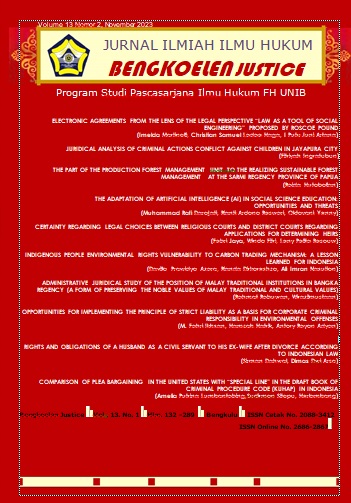Main Article Content
Abstract
Implicitly, the provisions in the Environmental Protection and Management Law (henceforth UUPPLH- Undang-Undang tentang Perlindungan dan Pengelolaan Lingkungan Hidup) regarding the principle of strict liability, as stated in Article 88 and its explanation, only regulate strict liability as a civil responsibility. The UUPPLH does not provide provisions on whether the principle of strict liability can be applied as a model for criminal liability, particularly for legal entities or corporations recognized as legal subjects in criminal law (rechtperson). This research aims to analyze and examine the implementation of the principle of strict liability in the UUPPLH and to analyze that violations of environmental offenses under the UUPPLH by corporate legal subjects can be subjected to strict liability as criminal responsibility. The criminal responsibility adopted by Law Number 32 of 2009 concerning Environmental Protection and Management still adheres to the principle of fault. Therefore, in applying the strict liability principle in court, it is only used for civil claims, and its use in criminal law enforcement is minimal, as evidenced by several court decisions. In conventional criminal law, criminal liability is based on fault, commonly known as the principle of no punishment without fault (geen straf zonder schuld). However, the principle of strict liability, as liability without fault, is also recognized as a fundamental principle in criminal responsibility.
Article Details
Copyright (c) 2023 M. Fahri Ikhsan, Antory Royan Adyan, Hamzah Hatrik

This work is licensed under a Creative Commons Attribution-ShareAlike 4.0 International License.

Ciptaan disebarluaskan di bawah Lisensi Creative Commons Atribusi-BerbagiSerupa 4.0 Internasional.
